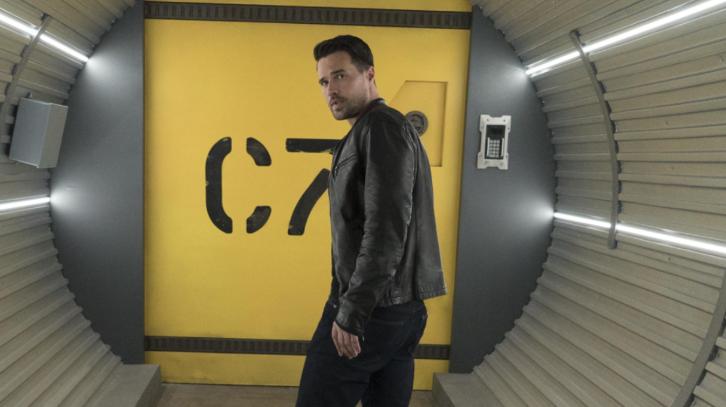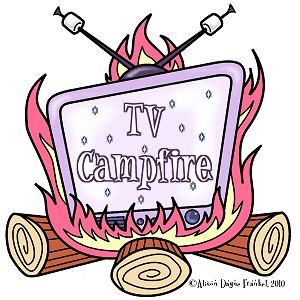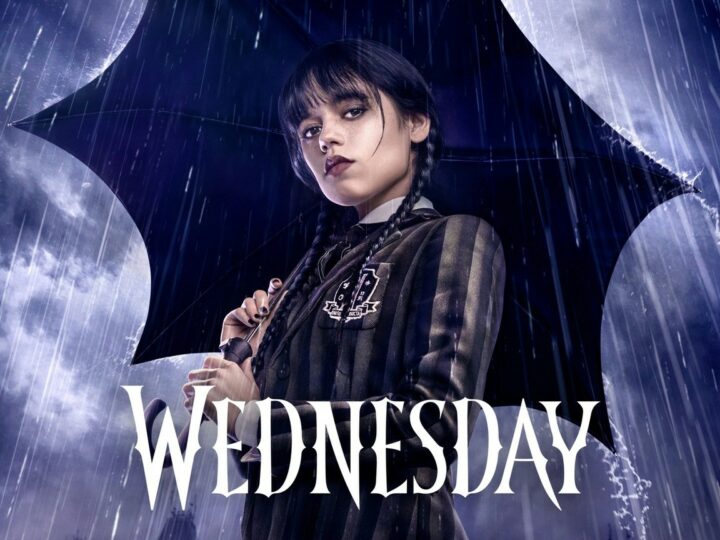
The Addams Family is not something I ever thought to describe with the words, “banal” or “conventional”. But then Netflix’s Wednesday debuted and, well, …here we are.
Produced by the tag team of Alfred Gough and Miles Millar, who previously gave the world the shamelessly silly elves-in-the-post-apocalypse epic, The Shannara Chronicles and the comic book quintessence of queer-baiting, Smallville, Wednesday is fashioned as the latest take on illustrator Charles Addams’ popular series of single panel cartoons for the New Yorker magazine. Specifically, the ones featuring his merrily macabre “Addams Family”, which ran from 1937 to (appropriately enough) his death in 1988.
There have been numerous adaptations of the characters over the years, from the 1960’s TV series starring John Astin and Carolyn Jones, to the 1990’s big screen features starring Raul Julia and Anjelica Huston, plus a slew of animated versions and even a Broadway musical scattered between. They’ve varied in both artistic and popular success, but what they all seemed to grasp is that the crux of the Addams Family, the center and soul of their humor, lies in their basic decency. As weird as they are, as bizarre, dark and twisted as their tastes may be, they are also utterly honest, generous, kind, bereft of prejudice, and oddly – very oddly – innocent. An island of healthy, well-adjusted, endlessly supportive, unconditional familial love in a sea of blandly normal-seeming, but deeply neurotic and even outright unpleasant “regular” folks.
Wednesday ignores all that. The characters here seem to bear little relation to the source material, or any of the previous adaptations. Instead, Wednesday comes off as less Addams Family than The Chilling Adventures of Sabrina meets Nancy Drew by way of Riverdale and The Vampire Diaries, with a dollop of Harry Potter thrown in because …I dunno, …it’s a law, or something.
The wrong notes hit pretty much immediately, as the very first scene depicts our titular heroine finding little brother Pugsley tied up and tossed in her school locker. He falls out traumatized, as any little kid would be. The trouble is, he isn’t just any little kid. He’s Pugsley Addams, mini sadomasochist extraordinaire, whose idea of fun involves alternately poisoning and being electrocuted by his sister. He should have enjoyed that sort of thing.
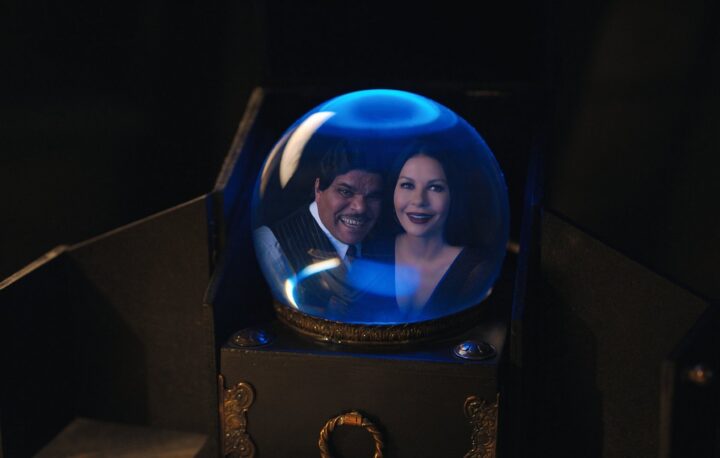
The heads of the family fare no better, with Catherine Zeta-Jones slathered in distractingly troweled-on pale pancake make-up and left stranded playing Morticia as a winey helicopter mom desperate for her daughter to make good and fit in, and Luis Guzmán, an otherwise fine actor, who has absolutely no business playing Gomez, and spends his every moment of screen time proving this and looking horrendously uncomfortable while at it. Together, their sole function within the story (other than being the focus of a C plotline “mystery” that the show gets tired of and throws away like a used Kleenex halfway through) is to endlessly push their daughter toward the joys of empty scholastic achievement and social conformity.
Somewhere, the New Yorker, TV, and movie mère and père Addams are screaming in impotent rage.
Considering the source, G&M really could have gone almost anywhere with the series, structure-wise. Instead, they’ve chosen to be as safe and conventional as possible; setting the show in a budget Hogwarts-esque boarding school for “outcasts”, filling it with typical teen angst, social cliques, clueless grownups, and romantic entanglements, and dumping a not-very-mysterious monster murder mystery on top of it all.
There is something rather cynical in Wednesday’s absolute commitment to the YA formula. Granted, considering its current Netflix ranking, the showrunners cannot be faulted for not knowing their target demographic. But successful pandering is still pandering.
Speaking of cynicism, Wednesday takes something of a bizarre approach in its notion of diversity, with the show’s few black characters relegated to the roles of, respectively, mean girl, bully, con artist, and …wait for it! …pro-Manifest Destiny theme park tycoon.
Yes, really.
If there is any part of this series guaranteed to make one’s jaw drop and head hurt, it’s the completely irony-free depiction of a creepily commercial colonizer-fest called, “Pilgrim World”, wholly owned and operated by a black father and son; the cognitive dissonance of which is never explored or commented upon.
Adding yet more bafflement to the proceedings, one of the listed executive producers is none other than Tim Burton, who also directed half the episodes. With an auteur like that at the helm, Wednesday should be bursting at the seams with originality, energy and mind-bending weirdness. Instead, it amazes by how lacking in weirdness it is; trudging mechanically along its predictable path, mildly entertaining in spots, but overall determined to play it safe and color inside very narrow lines. It is perhaps the least Tim Burton-ish Tim Burton project Tim Burton has ever made.
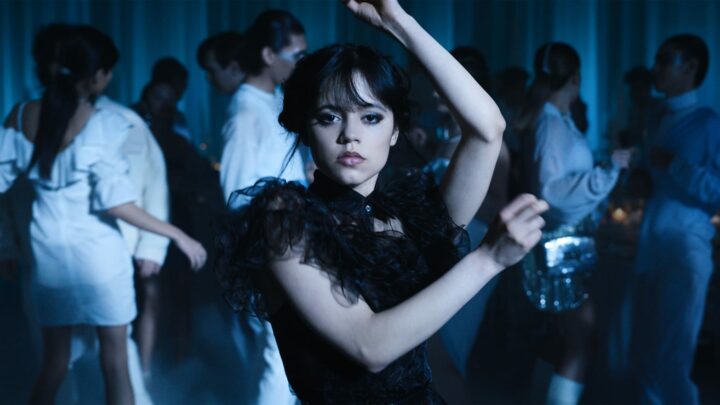
Having said all that, there are some things in the series that work. Chief among them, Jenna Ortega in the title role. She definitely has the right look for the part, and fantastic physicality, which is put on particularly impressive display at a school dance. But good as she is, she’s constantly undercut by a relentlessly pedestrian script, a CW-patented, angry teen loner take on the character that gets old quickly, and an emotional arc lashed to the incongruous moral lesson that conforming to the norm (even if “the norm” is a school full of sketchily conceived supernatural creatures) is the way to true happiness. It’s to her genuine credit that she manages to overcome those hurdles enough to provide a solid anchor to hold this drifting barge of a series in place.
Another thing that works is, well, Thing. Always a fan favorite, Wednesday takes Thing to a whole new level, making him an essential supporting character that is one part pet, one part fleshy Swiss army knife, and one part right hand …um, …hand. The special effects that go into making Thing work are truly impressive. But more impressive still is magician Victor Dorobantu who plays Thing and manages to convey more depth and range of emotion in his hand than many actors impart with their entire bodies.
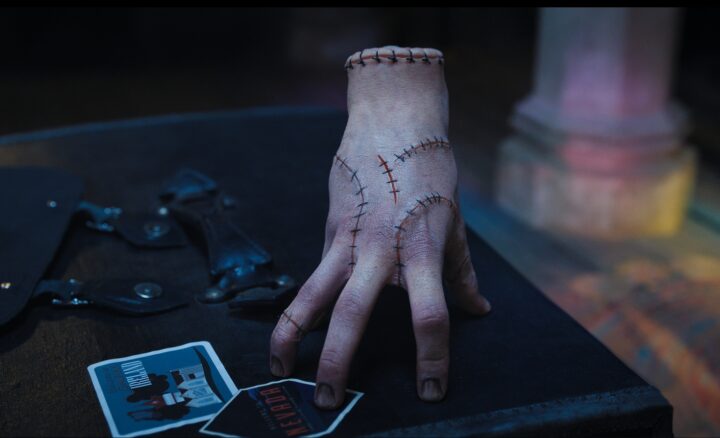
Kudos also to Fred Armisen, perfectly cast as Uncle Fester. He captures the Addams Family spirit with an infectious sense of demented fun and a vocal nod to the original Uncle Fester, the late, great Jackie Coogan. Even Wednesday, herself, comes alive in his presence; which is great, even if it does shine a glaring spotlight on the happy oddball vibe desperately missing from her interactions with the rest of her family. The show immediately perks up when he makes his too brief appearance. If the series does, as expected, get a second season, they’d do well to include more Uncle Fester in it.
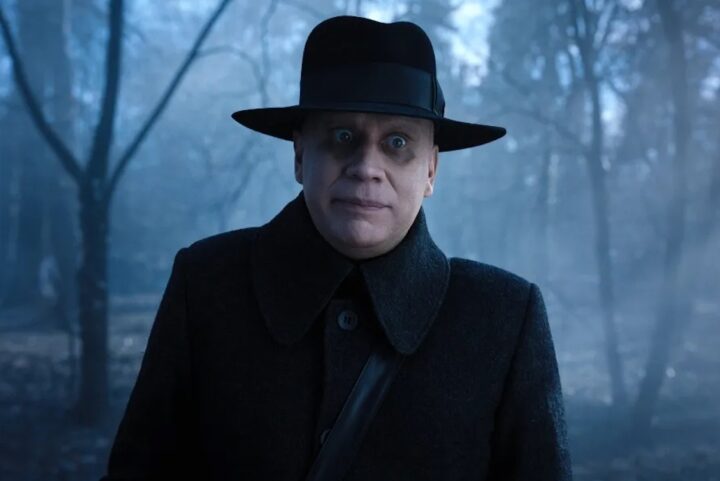
Also notable, are Gwendoline Christie, stylishly domineering as Principle Weems, and a near-unrecognizable Christina Ricci as dorm mom and horticulture teacher, Marilyn Thornhill.
It is true that if one cannot produce a remotely coherent plot or write dialogue worth a dime, one had better have high enough production values to distract from these failings, and Wednesday gets off lucky in this regard. The production, set, lighting and costume design are all solid, giving the series a cool, gothic look. And the music, partly written by Danny Elfman, injects some much-needed quirkiness and atmosphere into the proceedings.
All-in-all, as a Netflix vehicle, Wednesday is snazzy-looking enough to divert most audiences from noticing the wear on the tires and the rusty hamster wheel-powered engine under the hood. The shame is how much potential a series like this had for being something really wild, fun and imaginative. But, instead, opted for being safe, formulaic, and trite.
I predict it’ll be a huge success.
Until Netflix suddenly kills it after season three with a ruthlessness that Wednesday Addams would admire.




